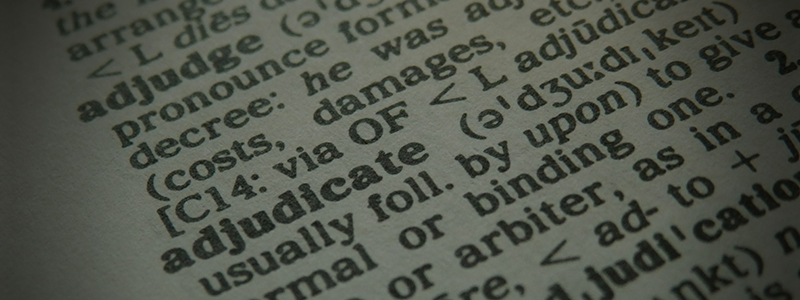29-06-2020
Construction firms have since time immemorial been faced with insolvency problems further aggravated by lengthy and uncommercial court proceedings. Many disputes cause insolvencies in construction. The Adjudication process has successfully assisted with obtaining payments due, but the law had outlawed the adjudication process in cases where one party is or has become insolvent as it is said that the decision is temporarily binding and can be reversed, making it impossible for the party who is ordered to pay to get their money back. In practice the vast majority of cases are never reversed. The Supreme Court has now delivered in Bresco v Lonsdale on 17th June 2020 a landmark change in the law, allowing insolvent parties to now adjudicate, opening the door to insolvency practitioners, with a tool to obtain all monies owed through adjudication.
Adjudication is a fast and cost-effect dispute resolution process that is available as a statutory right to parties to a construction contract. The adjudication process generally takes 28 days and the adjudicator’s decision is legally binding on the parties, enforceable by summary judgment.
Due to the swift nature of the process, the costs of Adjudication are much lower than those of other dispute resolution processes, making it attractive to insolvent companies seeking to recover debts. However, the adjudication regime was perceived to be in conflict with the rules of insolvency set-off as set out within The Insolvency (England and Wales) Rules 2016 at section 14.25 as enforcing an adjudication against a creditor in circumstances of mutual debts with an insolvent company would result in the creditor being required to pay its side of the debt to the insolvent company without mutual set-off. Thus creating the exact scenario that the insolvency set-off rule aims to avoid.
Companies in Liquidation or Administration Can Now Adjudicate to Resolve a Construction Dispute
Within the recent decision of the Supreme Court Judgment of Bresco Electrical Services Ltd (in liquidation) v Michael J Lonsdale, 17th June 2020, the Supreme Court considered the relationship between the construction adjudication regime and the insolvency set-off rules and decided that there is no incompatibility between the two regimes and as such a company in liquidation may refer a dispute to adjudication.
The Facts of Bresco and Lonsdale
- Bresco were employed by Lonsdale to carry out electrical works, which commenced in 2014.
- In 2015 Bresco entered insolvent liquidation and a dispute arose as to the sums due between the parties.
- In 2018 Bresco’s liquidators referred its payment claim to adjudication. Lonsdale applied for an injunction to stop the adjudication, arguing that the adjudicator lacked jurisdiction to decide the referred dispute.
- Lonsdale argued that the adjudicator could only adjudicate a dispute “under the contract”, as the rules of insolvency set-off had been triggered and the dispute under the contract had been replaced by the different dispute as to the net balance left after mutual set-off.
- Lonsdale argued that this was a dispute under the Insolvency Rules and not “under the contract” and thus the adjudication was without jurisdiction. (“the jurisdiction point”).
- The Technology and Construction Court (TCC) granted Lonsdale’s injunction and restrained Bresco’s adjudication on the jurisdiction point.
- In 2019 Bresco referred to the Court of Appeal seeking to overturn the TCC Judgment. The Court of Appeal disagreed with the TCC findings on jurisdiction but continued the injunction on the basis that it considered that the adjudicator’s decision would not be enforceable until the liquidator calculated the net balance, thereby rendering an adjudication pointless (“the futility point”).
- The matter was finally referred to the Supreme Court and Bresco sought to lift the injunction, which Lonsdale cross-appealed against the Court of Appeal’s findings as to jurisdiction.
Jurisdiction – Do the insolvency set-off rules prevent the right to adjudicate?
The Supreme Court considered the potential incompatibility between adjudication proceedings and the insolvency rules, in particular whether the statutory right to refer a single dispute to adjudication at any time is trumped by the insolvency set off procedure.
The Supreme Court found no incompatibility in the regimes and held that the construction “dispute” is not replaced by the insolvency action upon insolvency and that a liquidator may pursue a claim in contract, including by adjudication, as “the pleaded claim remains one based upon the underlying contract, even if an undisputed set-off is acknowledged.”1
Futility – Is an adjudicator’s decision relating to an insolvent company enforceable?
The Supreme Court overturned the Court of Appeal’s prior conclusion that an adjudication by an insolvent company would be futile, deciding that the insolvency process and the existence of cross claims was not a basis for restraining an adjudication, stating that “the insolvent company has both a statutory and a contractual right to pursue adjudication”2 and that “it would ordinarily be entirely inappropriate for the court to interfere with the exercise of that statutory and contractual right.”3
The Supreme Court also acknowledged that adjudication "had provided to be a mainstream dispute resolution mechanism in its own right, producing de facto final resolution of most of the disputes which are referred to an adjudicator”4 as in practice “adjudication does, in most cases, achieve a resolution of the underlying dispute which becomes final because it is not thereafter challenged.”5
As such Bresco’s appeal was allowed on the basis of adjudication being a valid form of ADR irrespective of enforceability.
In addition to dismissing the claims of incompatibility, Lord Briggs in delivering the Judgment noted that adjudication can be an appropriate form of addressing disputes involving insolvent companies as “the process of proof of debt in insolvency shares many of the attractive features of adjudication, in terms of speed, simplicity, proportionality and economy, but adjudication has added advantage that a construction dispute arising during an insolvency will be more amenable to resolution by a professional construction expert than by many liquidators”.6
What does the Supreme Court’s decision mean for construction and insolvency practitioners?
The Judgment is good news for construction professionals and insolvency practitioners as liquidators and insolvent construction companies are now allowed to take advantage of the swift and cost-effective adjudication process to adjudicate disputes with creditors. Past claims that may have been previously dismissed due to party insolvency may now be revived as a result of this decision. This access to adjudication is particularly beneficial in the current environment created by Covid-19, where economic uncertainty may lead to increased numbers of construction industry insolvencies. The judgement is another blow against payment malpractice in the construction industry and should reduce insolvency and allow firms the chance to be rescued from the brink.
Furthermore, not only has the Supreme Court affirmed the right to adjudicate but has also highlighted the benefit of using adjudication as a dispute resolution method in its own right.
NEXT STEPS
Arbicon can assist both insolvency and construction professionals, specialising in establishing the value of sums due under construction contracts and prosecuting claims through adjudication.
Our dedicated construction adjudication page provides more details about adjudication including the process of appointing an adjudicator. If you have a dispute that you believe may benefit from adjudication, then contact us today on 01733 233737 or email advice@arbicon.co.uk for further details on how we can help.


